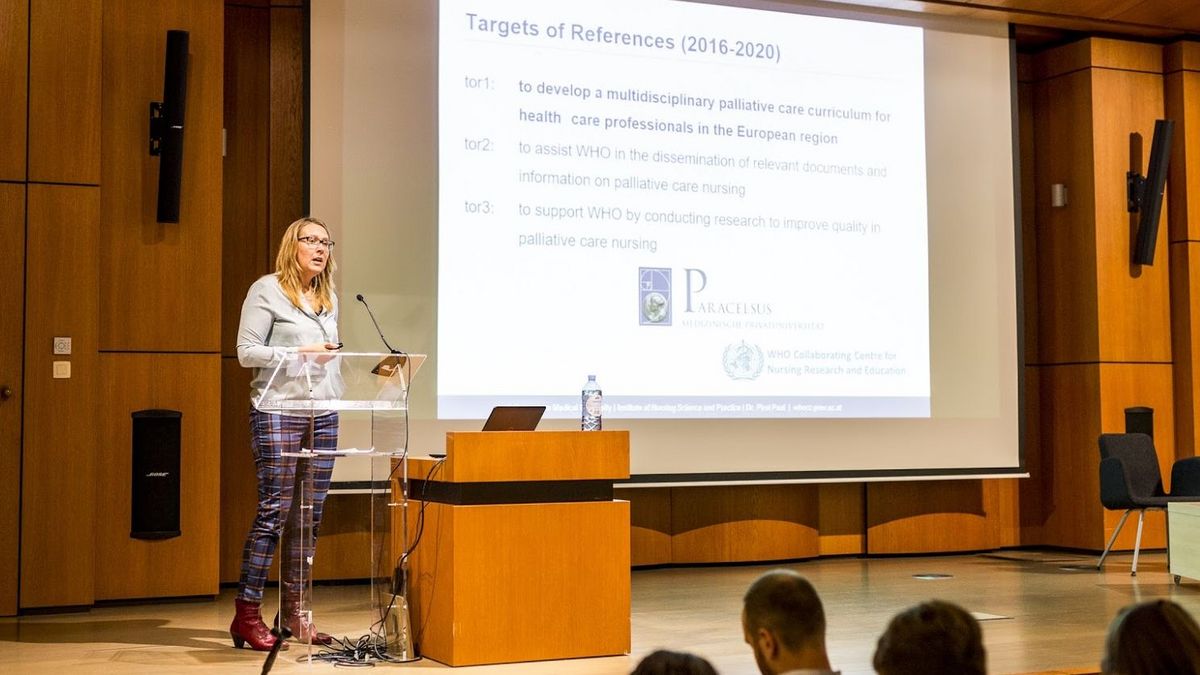The international seminar was opened by Prof. Augusto Caraceni, Chair of EAPC Research Network. After the welcoming words Prof. Agnes van der Heide continued with an impressive speech on doing research in palliative care from epidemiological point of view. Her main message was that numbers are of the essence but are not sufficient; hence, they must always be combined with the narrative of patients and caregivers. Prof. Joachim Cohen demonstrated how big data, such as fiscal data, medication dispensations, death certificate or census data, may improve palliative care research. Doctoral scholar, Yakubu Salifu, gave insight into men and family caregivers’ experiences of advanced prostate cancer in Ghana. His abstract won also the Best Abstract Award. Elisabeth Honnix introduced the results from the PACE study that expressed the complexity in dying in long term facilities across six European countries. Kim de Nooijer compared the quality of primary palliative care for old people in Belgium, Italy and Spain and pointed out many differences as well as need for improvement in all regions.
Amanda Roberts presented her study on bereavement in Republic of Ireland, pointing out that the main resource and help in times of grief comes from friends and family. The same message, need for developing and supporting community based services, was put forward in presentations from Sweden, Ireland, UK, and Spain. Researchers engaging people to open up about death and dying and giving them an opportunity to think and speak about death – either via therapy cards, street interviews, or art projects – has been very much welcomed, but surely more can be done in this area as death is a social and not a medical issue. Rebecca Lloyd made 2100 people tweet about death and one of the main messages she received was: “I do not want to die with pain”. The interest in social change and empowerment as well as looking beyond the mere health services became the main message of the both seminar days.
On the second day Federal Minister of Health and GP, Dr. Maggie De Block endorsed the meeting by giving a speech about the meaning of palliative care in public health. According to Libby Sallnow the new public health should shift from being service-centred to people-centred, an approach that is participatory and emancipatory by its nature. People prefer to be part of the community and not as patients. To make a permanent change, such as develop complex research interventions, key stakeholders need to be engaged. Joni Gilissen pointed out that a theory of change could be useful in this regard. Rigorous and high quality research was presented on supporting homeless people, caregivers, volunteers and communities. Besides oral presentations also poster presentations demonstrated the continuous shift for better research in palliative care.
The invited plenary speaker, Prof. Xavier Gomes Batiste from the Catalan Institute of Oncology, pointed out that training is the key solution for early integration of palliative care services. He admonished that palliative care is the “soul” of chronic care programmes. Furthermore, psychosocial and spiritual care is the most lacking part of these trainings. Dr. Piret Paal from the Paracelsus Medical University presented the latest findings from the EAPC educational survey. Her presentation highlighted the importance of including education in the definition of palliative care. This message was very well received by all participants.
Libby Sallnow summarized the two day seminar as follows: "It was inspiring to see such high quality research and insights into the relationship between public health and palliative care. Well done to the organisers and all who submitted work to be presented!"
Recap of the seminar on Twitter under @EoLC_research and #phrpc


